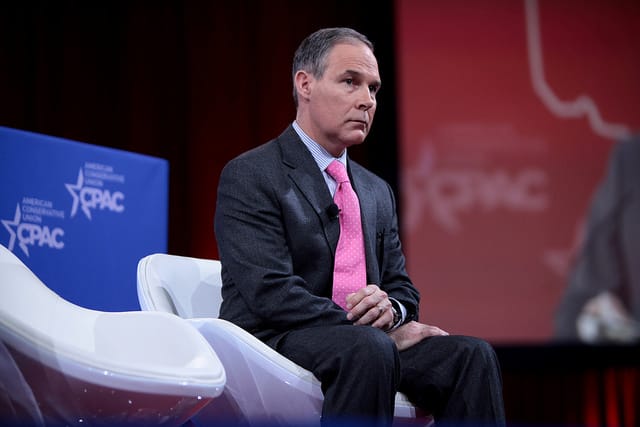Cornucopia’s Take: Chlorpyrifos was banned by the Obama administration due to its toxicity, notably causing brain damage in children. EPA scientists were in rare agreement on banning this pesticide, but Trump’s former EPA Administrator Scott Pruitt called for more study instead. Sued by multiple public interest groups over this decision, the EPA has now been ordered by a federal court to finalize the ban on chlorpyrifos within 60 days. This is a victory for U.S. children and farmworkers. Chlorpyrifos is not allowed in organic agriculture.
Court Orders EPA To Ban Chlorpyrifos, A Pesticide Linked To Brain Damage In Kids
Huffington Post
by Chris D’Angelo and Alexander C. Kaufman
Pediatricians warned that keeping it on the market put “all children at risk.”
 |
Source: Gage Skidmore |
A federal court on Thursday ordered the Environmental Protection Agency to ban a widely used pesticide that’s been linked to learning disabilities in children and that former agency chief Scott Pruitt refused to take off the market.
The U.S. Court of Appeals for the 9th Circuit ruled in a 2-to-1 decision that the EPA offered “no defense” of its decision to delay a ban on chlorpyrifos ― a move the court said violated the Federal Food, Drug and Cosmetic Act. The law governs pesticides and requires the EPA to ban chemicals from being used on food if they are proven to cause harm.
The agency has 60 days to finalize a ban.
The decision is a major blow to Pruitt, who signed an order in March of last year to allow chlorpyrifos, an organophosphate insecticide that has been used on crops such as broccoli to cranberries since the 1960s, to remain on the market for agricultural use. His decision defied the recommendation of EPA scientists.
Under the Obama administration in November 2015, the EPA proposed permanently banning the chemical on food crops, citing potential risks to human health.
But in March 2017, Pruitt reversed plans to ban the chemical in one of his first and most widely criticized moves as EPA administrator. The agency offered little explanation for the decision ― Pruitt claimed the Obama administration relied largely on studies “whose application is novel and uncertain, to reach its conclusions” ― but said it planned to keep studying the health effects.
In a statement, the EPA criticized the Columbia Center for Children’s Environmental Health for refusing to release data from the epidemiology study used to propose the rule banning chlorpyrifos in November 2015. Epidemiological studies typically rely on granting anonymity to its survey respondents to protect their health privacy and undergo rigorous standards at the research institutions that fund them. The agency first requested the data set in 2010, but the Trump administration ramped up calls for the release as part of a widely condemned proposal of a rule that would require the EPA to rely on studies that make their data public.
“EPA is reviewing the decision,” said agency spokesman Michael Abboud. “The Columbia Center’s data underlying the Court’s assumptions remains inaccessible and has hindered the Agency’s ongoing process to fully evaluate the pesticide using the best available, transparent science.”
Critics blasted Pruitt and President Donald Trump for putting corporate profits ahead of public health and safety.
In a joint letter to Pruitt in June, the American Academy of Pediatrics and Environmental Working Group, a nonprofit advocacy group, said they were “deeply alarmed” by his decision.
“EPA has no basis to allow continued use of chlorpyrifos, and its insistence in doing so puts all children at risk,” they wrote.
Chlorpyrifos, produced by Dow Chemical Co. and commonly known by its trade name Lorsban, is used in nearly 100 countries on more than 50 different crops. It was largely banned in 2000 for at-home use in the U.S. but continues to be widely used on thousands of American farms.
Annual testing reports by the Department of Agriculture show chlorpyrifos residues in nectarines, peaches, cucumbers and other crops. Studies have shown that children exposed to organophosphate pesticides, such as chlorpyrifos, have an increased risk for abnormal neurodevelopment, including persistent loss of intelligence and behavior problems. Even low-dose exposure to organophosphates, particularly in the womb, has been found to harm brain development, leading to higher risk of disorders like autism.
Pruitt spent much of his short tenure, which ended last month amid a mountain of personal and ethical scandals, deflecting questions about his refusal to ban the chemical. In contentious congressional hearings, he repeatedly downplayed the decision and said the research was continuing. At times, he even suggested the agency could instate the ban but gave no clear timeline for when that would happen.
Environmental groups, many of which have been pushing for years for a full ban on the chemical, applauded Thursday’s ruling.
Marisa Ordonia, an attorney for Earthjustice, one of three environmental groups that sued the EPA in April 2017 to force a chlorpyrifos ban, said in a statement Thursday that the the court had ended “EPA’s shameful actions that have exposed children and farmworkers to this poison for decades.”
Erik Olson, the senior director of health and food at the Natural Resources Defense Council, called the ruling a “victory for parents everywhere.”
“Some things are too sacred to play politics with—and our kids top the list,” he said in a statement. “The court has made it clear that children’s health must come before powerful polluters.
In May, Hawaii became the first U.S. state to ban the use of chlorpyrifos.

